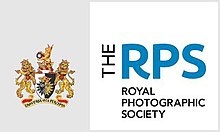
Back Kral Fotoqrafiya Cəmiyyəti Azerbaijani Royal Photographic Society Catalan Královská fotografická společnost Czech Royal Photographic Society German Royal Photographic Society Spanish Royal Photographic Society Finnish Royal Photographic Society French Royal Photographic Society Italian 英国王立写真協会 Japanese Royal Photographic Society Portuguese
 | |
| Formation | 20 January 1853 |
|---|---|
| Headquarters | Bristol, United Kingdom |
| Membership | 10,200 |
Patron | Catherine, Princess of Wales |
President | Simon Hill, HonFRPS |
CEO | Dan Jones |
| Website | rps |
The Royal Photographic Society of Great Britain,[1] commonly known as the Royal Photographic Society (RPS), is one of the world's oldest photographic societies. It was founded in London, England, in 1853 as the Photographic Society of London with the objective of promoting the art and science of photography, and in 1853 received royal patronage from Queen Victoria and Prince Albert.[2]
A change to the society's name to reflect the patronage was, however, not considered expedient at the time. In 1874, it was renamed the Photographic Society of Great Britain, and only from 1894 did it become known as the Royal Photographic Society of Great Britain, a title which it continues to use today. On 25 June 2019, the Duchess of Cambridge, now Catherine, Princess of Wales, became the Society's Patron, taking over from Queen Elizabeth II who had been patron since 1952.[3]
A registered charity since 1962, in July 2004,[4][5] the society was granted a royal charter recognising its eminence in the field of photography as a learned society.[1][6] For most of its history the Society was based at various premises in London; since 2019 its headquarters and gallery are in Bristol, England. Membership remains international and open to anyone with an interest in photography.
In addition to ordinary membership, the Society offers three levels of distinction—Licentiate, Associate and Fellow—which set recognised standards of achievement throughout the world, and can be applied for by both members and non-members, in all aspects of photography and vocational qualifications in the areas of creative industries and imaging science.[7] The Society runs a programme of events throughout the United Kingdom and abroad, through local groups and special interest groups. The Society acts as a national voice for photographers and for photography more generally, and it represents these interests on a range of governmental and national bodies dealing with matters such as copyright and photographers' rights.
- ^ a b "Privy Council Office – Record of Charters Granted". Archived from the original on 21 August 2016. Retrieved 10 June 2016.
- ^ The Society received a letter from Buckingham Palace dated 30 May 1853 which confirmed the monarch's and her consort's patronage. It was reproduced in the Photographic Journal, dated 21 June 1853, p. 69.
- ^ "Duchess of Cambridge becomes new Society Patron". Royal Photographic Society. 25 June 2019. Archived from the original on 11 July 2019. Retrieved 25 June 2019.
- ^ "The Royal Photographic Society Of Great Britain (current), registered charity no. 1107831". Charity Commission for England and Wales.
- ^ "The Royal Photographic Society Of Great Britain (former), registered charity no. 212684". Charity Commission for England and Wales.
- ^ "History – RPS". Archived from the original on 14 July 2016. Retrieved 10 June 2016.
- ^ "About Distinctions – RPS". Archived from the original on 10 June 2016. Retrieved 10 June 2016.